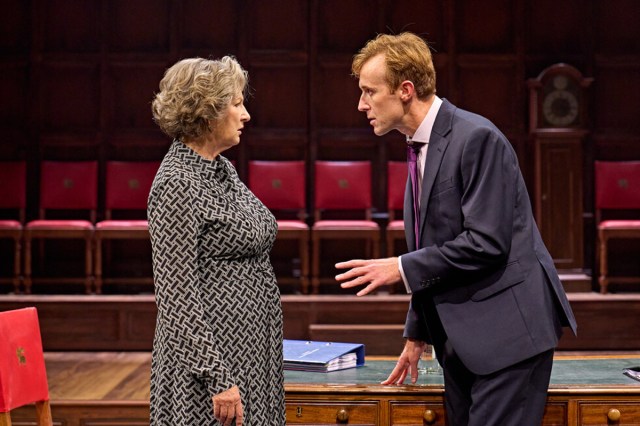The Inquiry at Chichester’s Minerva Theatre – review
The new political drama has its world premiere in Chichester

The duplicitous world of politics and the complex machinations of public inquiries is brought to life in this new (and first) play by Guardian investigations journalist, Harry Davies. It’s an intriguing watch despite being dramatically rather stagnant.
Arthur Gill (John Heffernan) is the Government’s Justice Secretary and Lord Chancellor; he is also a prospective leadership candidate to become the next Prime Minister. When he is potentially implicated in a judge-led public inquiry over a mildly absurd environmental scandal, the Machiavellian plotting begins. Leaks, deception, impropriety and incompetence all come out to play – well what else would you expect in Westminster. Davies admits to having a personal fascination with public inquiries and his detailed knowledge of political process is obvious, there is also a cynicism to his work as he makes clear that, in the world of politics, even the seemingly incorruptible can fall foul to the dirty dealings on offer.
The stoically decent and robustly righteous Judge Wingate (Deborah Findlay) heads the inquiry and imperiously vents her fury at being frustrated in her work by the politics and by the slimy corporate lawyers (a brilliantly sleazy Malcolm Sinclair). It’s Judge Wingate’s own past that leads to the unlikely and overly convenient twist at the end, and the ultimately self-destructive tactic that the Lord Chancellor chooses as leverage seems somewhat ludicrous (I won’t give it away here). One has to cling to the hope that those involved in the real world of politics are neither this lowly nor stupid.
Joanna Bowman rather pedestrianly directs with a safe hand on the tiller. Perhaps the dry subject of public inquiries allows little opportunity for too much excitement, but this frustratingly subdues the pace of the evening despite being performed with real class by the small company.
Findlay is particularly crisp and engaging as Wingate. With an air of civil conscience and morality about her, she graciously navigates her way through the dirty political water and charges head on into the press circus that, whilst unseen, is easy to imagine would be swirling. She keeps her haughty head on but gives just enough flashes of vulnerability to reveal her human side.
Heffernan’s politician is an appropriately chameleon-like mix of smugly likeable one minute, and obnoxiously dislikeable the next. Ruthless and self-servingly career-focussed, there are moments that generate sympathy, but ultimately, it’s a bleak look at those that run our country.
Davies’ linear structure of the play makes for a slow reveal of any significant revelations, with what almost feels like two completely separate teams of actors performing alternate scenes during which neither ever cross over until the very end.
Despite its lack of dramatic tension, Davies has written what is still an intriguing and interesting basis of background and plot. Max Jones’ wide and largely empty parliamentary set breaks open to reveal some nicely detailed alternative settings on two occasions. It is blandly reflective of the piece as a whole, only providing occasional flashes of curiosity – just enough to keep you interested whilst never fully satisfied.















